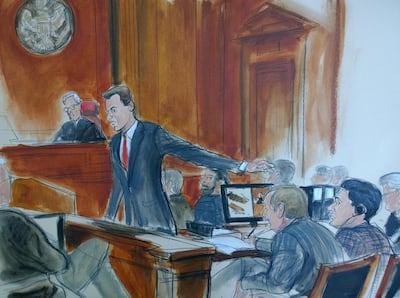A cover-up of Iranian efforts to evade US economic sanctions reached to the highest levels of the Turkish government, according to prosecutors in the trial of a Turkish banker accused of masterminding a network of fake deals and front companies to launder cash held in Turkey.
The case, being heard in New York’s federal court, has already raised tensions between the US and Turkey, which accuses Washington of interfering in Turkish politics.
In his opening statement, assistant US attorney David Denton said Mehmet Hakan Atilla told lies that gave Iran access to American banks and threatened US national security.

"This is a case about lies, lies that were told to the US by people doing the bidding of the Islamic Republic of Iran," he said, describing the country as one of the foremost state sponsors of international terrorism.
He said it involved senior figures in Turkish politics and affected economies throughout the Middle East.
Prosecutors have charged eight people in connection with a conspiracy which they say used fake gold transactions and food purchases to launder Iranian money held in Turkish bank accounts.
It emerged on Tuesday that a second man in US custody Reza Zarrab, a Turkish-Iranian gold trader, will now appear as a prosecution witness after striking a plea deal.
Mr Denton said Zarrab was the frontman for the deals while Atilla, an expert in sanctions and the deputy general manager of international banking at Halkbank, was the architect of the plan.
He exploited two loopholes — permitting gold and food purchases — to avoid sanctions and transfer cash to Iranian interests. Couriers would travel with suitcases full of gold from Turkey to Dubai, where it could be sold and the proceeds used by Iran to make payments around the world.
When that avenue was shut down by US authorities, Atilla created a series of fake food deals.
“There was no food, there were no humanitarian shipments,” said Mr Denton. “Wheat does not come from Dubai. It’s surrounded on three sides by the Arabian desert.”
Instead, Mr Denton said the defendant had answered the call made by Ayatollah Ali Khamenei for an “economic jihad” to beat US sanctions.
Atilla denies the charges.
The trial began against a backdrop of political intrigue in Turkey where a court issued warrants for the arrest of two men for providing fake evidence in the case, according to private broadcaster CNN Turk.
It identified the men as a former opposition politician and a banking auditor, both of whom were named on the witness list at the New York trial, according to CNN Turk.
It shows the sensitivity of a case that threatens to draw back a curtain on Turkey’s relations with Iran.
Prosecutors allege Turkey's former economy minister Zafer Caglayan was involved in the conspiracy. He denies the charges.
The government of President Recep Tayyip Erdogan claims the case has been fabricated for political reasons. Tensions between Ankara and Washington have flared and traders say the controversy has driven the Turkish lira to record lows.
In a recent court filing, prosecutors said Zarrab once told another defendant he had spoken with Mr Erdogan directly about the alleged scheme.
For his part, Mr Erdogan has made clear he views the trial as the latest chapter in the attempted coup against him last year. His supporters say they see the hand of Fethullah Gulen, the US-based cleric who they accuse of plotting the uprising, in the allegations.
The media has been awash with stories casting the case as a conspiracy against Turkey and the president has repeatedly raised the issue with his American counterpart.
A week ago, Turkey launched an investigation into Preet Bahara, the former US attorney for southern New York whose office filed the original indictment.
The flurry of attacks has prompted an extraordinary response in New York. Not only the prosecutor but the judge in the case spoke up to defend the integrity of the American justice system.
Joon Kim, Mr Bahara’s successor, said it was “ridiculous” to think the case was driven by Turkish politics.
“It displays a fundamental misunderstanding or lack of understanding of how our system of justice works and, frankly, how the rule of law works,” he said.
Richard Berman, the judge hearing the case, also made clear his irritation.
He said officials were free to comment on the trial but added that the best way Turkish politicians could help was by ensuring the availability of witnesses and evidence for the defence.
That was not enough to prevent President Erdogan weighing in again.
“We know too well, the issue here is not the future of our party, but the fate of our country,” he told parliament last week. “Under the cover of rule of law, one of the major traps against our country has been devised.”
It is not only Turkey that could be worried about Zarrab’s possible co-operation. Speculation is rife that he could also be talking to the special counsel team investigating ties between Russia and Donald Trump’s associates, including Michael Flynn, who served briefly as national security adviser.
Mr Flynn did some work for the Turkish government before the election and investigators are believed to be probing his links to Ankara.
Atilla's lawyer, Victor Rocco, told jurors in his opening statement that Zarrab was prepared to lie in order to avoid jail time and lacked credibility. He said he had been falsifying documents and misleading people for years.
“He’s an expert. He’s a master of deceit,” he said. “He did not need Hakan Atilla’s help”





